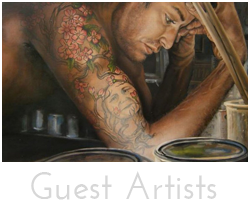 Is there really a market out there for the type of work I’m creating or does it just become something of appreciation? With the Internet giving us such prolific access to all kinds of images and resources does the appreciation extend to gallery walls? Are these spaces mostly reserved for painters and other graphic artist? I am currently on a quest to discover these sorts of venues that will show these types of images. Does being in a remote place like Montana hinder my quest for acceptance? I feel my network on the Internet has allowed me to enter circles of people who are appreciative of this sort of expression, but there is a vast distance between chatting and actually talking to someone about the possibilities of your vision becoming a reality. For some reason, the European market seems more open and tolerant for this sort of imagery than in the United States. I wonder why? Some how it seems this market is closed in the United States as we are caught in the trap of passing fancy and moving onto the next “it” thing that can become a sensation. For some reason American culture seems to be drawing toward a more transient disposable nature. Is it because we are such consumers and the options are seemingly limitless? The American obsession currently is our handheld mobile devises that connect us globally to anything we could possible ever desire merely for the charge of its access. We can find clothing, food, and sex with a few clicks of our fingers. I have many friends that support and love what I do and enjoy my process of creation. They bring my images up on their devises and have a vast collection of those images stored. But nonetheless, art is art, and it’s creation and display of these images must survive. In the days of George Platt Lynn these images were taboo, rarely shown, yet still collected by private collectors of such art, still to remain hidden for decades before they could be brought out for public exhibition. Now they are highly collectable because of the beauty of his vision, use of light, and perfect exposure. The late 70’s with the sexual revolution seem to bring about a public awareness of such imagery with the bold ventures of Robert Mapplethorpe and the American sexual revolution. When the world was struck by a virus called HIV, with the conservative climate of the Reagan administration, this form of art began to all be vanish. Pornography becomes prominent, flooding the market with cheap access that could use for private access and then be disposed of. In many ways the world of being captivated by fantasy is lost. Our culture seems to be moving toward that of instant physically gratification. Perhaps it has become far too easy to pick someone up on a mobile application than to view art. Yet I think art will remain to remind of our culture and become a marker of where we have been.
Is there really a market out there for the type of work I’m creating or does it just become something of appreciation? With the Internet giving us such prolific access to all kinds of images and resources does the appreciation extend to gallery walls? Are these spaces mostly reserved for painters and other graphic artist? I am currently on a quest to discover these sorts of venues that will show these types of images. Does being in a remote place like Montana hinder my quest for acceptance? I feel my network on the Internet has allowed me to enter circles of people who are appreciative of this sort of expression, but there is a vast distance between chatting and actually talking to someone about the possibilities of your vision becoming a reality. For some reason, the European market seems more open and tolerant for this sort of imagery than in the United States. I wonder why? Some how it seems this market is closed in the United States as we are caught in the trap of passing fancy and moving onto the next “it” thing that can become a sensation. For some reason American culture seems to be drawing toward a more transient disposable nature. Is it because we are such consumers and the options are seemingly limitless? The American obsession currently is our handheld mobile devises that connect us globally to anything we could possible ever desire merely for the charge of its access. We can find clothing, food, and sex with a few clicks of our fingers. I have many friends that support and love what I do and enjoy my process of creation. They bring my images up on their devises and have a vast collection of those images stored. But nonetheless, art is art, and it’s creation and display of these images must survive. In the days of George Platt Lynn these images were taboo, rarely shown, yet still collected by private collectors of such art, still to remain hidden for decades before they could be brought out for public exhibition. Now they are highly collectable because of the beauty of his vision, use of light, and perfect exposure. The late 70’s with the sexual revolution seem to bring about a public awareness of such imagery with the bold ventures of Robert Mapplethorpe and the American sexual revolution. When the world was struck by a virus called HIV, with the conservative climate of the Reagan administration, this form of art began to all be vanish. Pornography becomes prominent, flooding the market with cheap access that could use for private access and then be disposed of. In many ways the world of being captivated by fantasy is lost. Our culture seems to be moving toward that of instant physically gratification. Perhaps it has become far too easy to pick someone up on a mobile application than to view art. Yet I think art will remain to remind of our culture and become a marker of where we have been.



